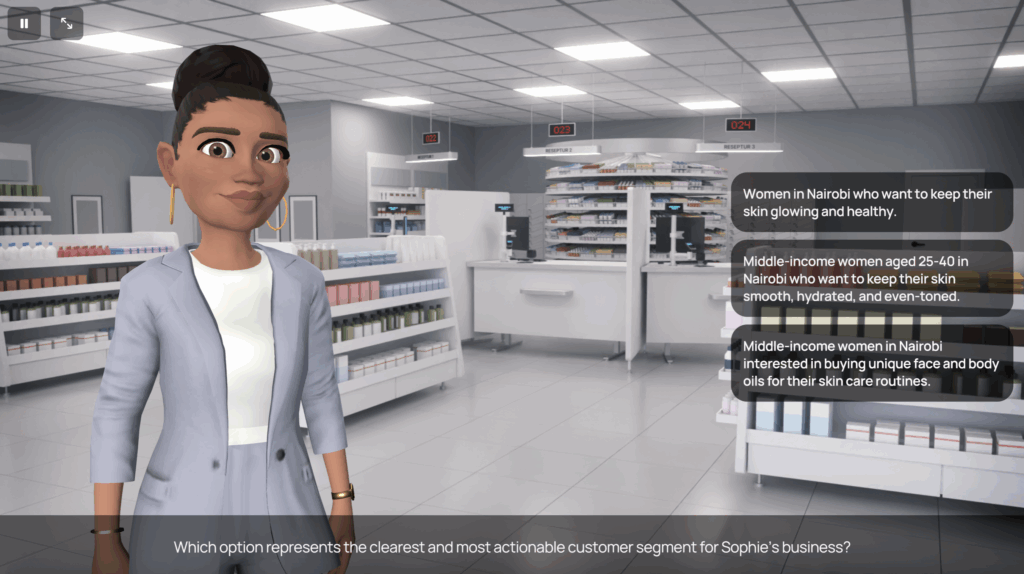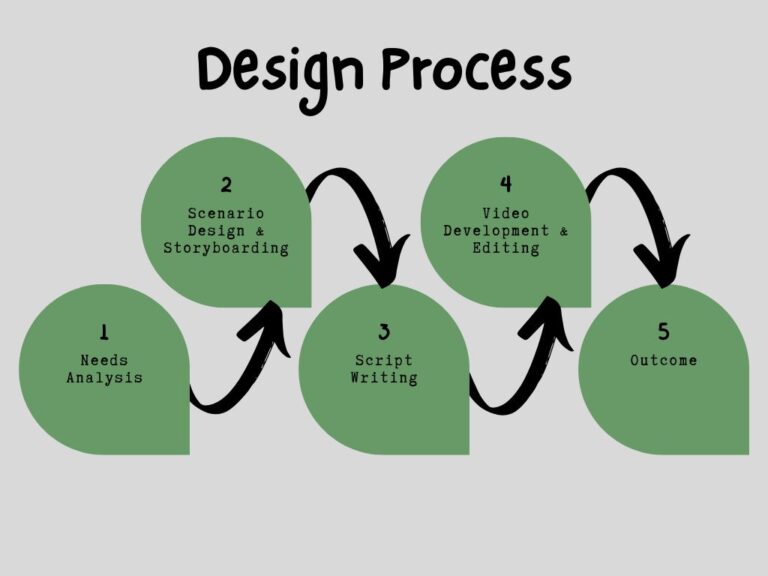
3D Animated Interactive Scenarios
As a Learning Experience Design Consultant, my goal for this project was to design visually engaging and instructionally effective 3D animated scenarios that help early-stage African entrepreneurs master complex business concepts.
The core challenge was that many learners struggled to apply abstract business frameworks, like value propositions, customer assumptions, and research methods, to real-world situations. Traditional instruction wasn’t enough to bridge this gap. Learners needed to see concepts in action, make decisions, and reflect on the outcomes in a safe, guided environment.
To address this, I developed a series of interactive scenarios using WeAre Learning, a tool that enables choice-based storytelling in a 3D environment without relying on branching logic. The scenarios were designed to simulate realistic business dilemmas and give learners a chance to test their understanding through guided decisions and immediate feedback.

- 🔍 Needs Analysis
- 🧾 Scenario-design and Storyboarding
- ✍️ Script Writing
- 🎬 Video Development and Editing
🎯 Outcome
🔍 Needs Analysis
To ground the experience in real learner needs, I began with a comprehensive needs analysis using a mix of qualitative and quantitative methods. I gathered data through:
Structured questionnaires (Google Forms)
One-on-one interviews
Ongoing feedback captured and organized using Google Sheets
These activities were conducted with course coaches, facilitators, and regional stakeholders to surface key insights, including:
Common misconceptions, such as confusion between research questions and specific customer questions
Content areas where learners struggled, like customer assumptions, value chain mapping, and prototyping
The need for more practical, scenario-based learning experiences to help learners apply abstract business concepts in real-world situations
This research directly informed the instructional design approach, ensuring the scenarios were both relevant and impactful.
🧾 Scenario-design and Storyboarding
Using the insights gathered during the needs analysis, I moved into scenario planning and storyboarding to shape meaningful, decision-based learning experiences. My goal was to help learners apply business concepts in context, using relatable, character-driven situations.
Created text-based narrative maps using Google Docs and Sheets to organize scenario flow, decision points, and feedback loops.
Designed each scenario around a fictional entrepreneur navigating realistic business challenges.
Framed each situation as a business decision, where learners acted as advisors and chose from structured options, each with instructional feedback tied to the learning goal.
Sequenced content carefully to support cognitive flow, allowing concepts to build naturally and prevent overload.
Ensured business accuracy by aligning every scenario with the course’s frameworks and terminology—such as TAM/SAM/SOM, value propositions, and feasibility assumptions.
These narrative maps served as the foundation for scripting and development, ensuring consistency, relevance, and a clear connection between learner choices and real-world outcomes.
✍️ Script Writing
With the scenario structure in place, I developed full scripts to guide narration-driven delivery. My goal was to make each concept clear, relatable, and easy for learners to follow, while embedding opportunities for active engagement and reflection.
Wrote narrative scripts that explained key concepts in a simple, structured, and engaging way, without relying on character dialogue.
Used a modular format (drafted in Google Docs) to organize scripts scene by scene, allowing for easy review, feedback, and revision.
Embedded micro-assessments throughout the scripts, including multiple choice, true/false, and “best advice” formats, to prompt learner decision-making.
Developed feedback loops tied to each decision point, offering immediate and clear explanations for both correct and incorrect responses, supporting self-paced learning and reflection.
Collaborated with the program designer to ensure the tone, pacing, and examples matched learners’ context and addressed the real challenges surfaced during needs analysis.
These scripts formed the backbone of each interactive scenario, bridging instructional clarity with scenario-based engagement.
🎬 Video Development & Editing
Once the scripts were finalized, I moved into scenario development using WeAre Learning, a 3D tool that supports linear, choice-based interactions.
Selected 3D environments and culturally relevant characters to reflect the realities of African entrepreneurs and ensure learners could connect with the context.
Synced voiceovers, camera movement, character gestures, and learner decision points to create a smooth and natural flow from scene to scene.
Adjusted scene pacing and transitions to manage cognitive load, ensuring each video was both instructional and engaging.
Carried out multiple internal test runs, refining timing and visuals for clarity and polish before finalizing each scenario.
Handled editing and final adjustments directly in the platform, maintaining tight control over both instructional quality and visual execution.
This phase required balancing instructional intent with animation flow, making sure that every element supported learning while still feeling seamless and immersive.
🎯 Outcome
The final interactive experiences would empower learners to:
- Practice applying business concepts in simulated real-world situations.
- Receive immediate feedback tied to clear reasoning.
- Make decisions with confidence and reflect on why certain business strategies work or fail.
These interactive videos were developed to serve as a core learning tool within the broader course strategy, helping turn abstract concepts into actionable, relatable learning moments.
Details
- Learning Experience Design
- eLearning Development
- Project Management
Tools
- WeAre 3D Animation Software
- Google Sheets
- Google Docs
Skills
- Learning Experience Design
- Needs Analysis & Assessment
- Storyboarding & Script Writing
- eLearning Development
- Project Management
